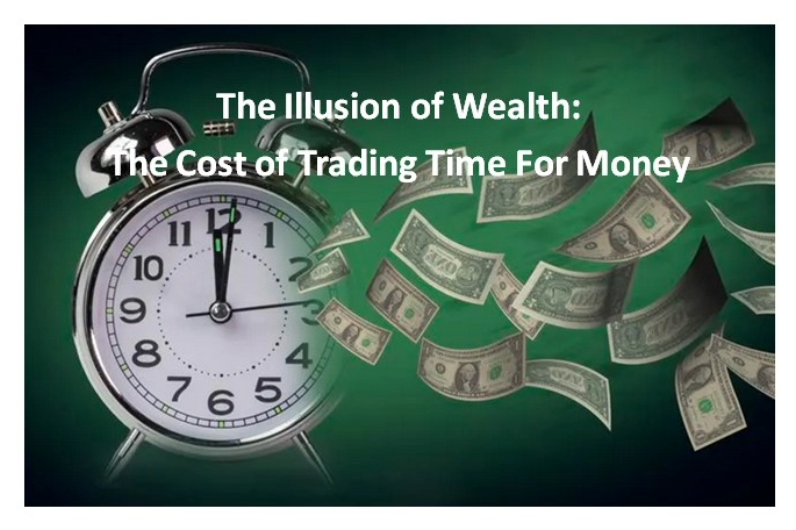
Perhaps it is just my DNA but I struggle to sit and read the same book for a few hours. This is why I generally have 4 – 5 books on the go. Currently, I am at various stages of reading the following books:
- Private Empire: ExxonMobil and American Power by Steve Coll
- Don’t Fall For It: A Short History Of Financial Scams by Ben Carlson
- Power Failure: The Rise and Fall Of An American Icon by William D Cohan
- Can’t Hurt Me: Master Your Mind And Defy The Odds by David Goggins
- How To Get Rich (Without Getting Lucky) by Naval Ravikant and Babak Nivi
The idea for this post has come to me after reading Chapter 6 – You Won’t Get Rich Renting Out Your Time in How To Get Rich (Without Getting Lucky).
The subject matter is nothing new and earth shattering. Judging by the behavior of many people, however, many never grasp the concept that the cost of trading time for money does not create wealth. This is not to say that trading time for money NEVER creates wealth. Generally, however, the cost of renting out your time requires the allocation of money in such a way that the investment(s) are what ultimately create wealth.
The most basic reason why trading time for money rarely creates wealth is that our input is closely tied to our output.
Compensation aligned to the number of hours worked means no compensation beyond 168 hours/week. It is impossible, unless through some miracle, to consistently work week after week for 24 hours a day 7 days a week.
It doesn’t matter if you are in a profession that commands a high salary. Medical professionals, for example, who become immensely wealthy have become so because they have a private practice. The private practice builds a brand that attracts patients.
In other instances, medical professionals may develop some kind of a medical device, procedure, or a process with an intellectual property.
As an employee, regardless of income, you work for somebody else who assumes the risk and accountability and who owns the intellectual property and the brand. The person assuming all the risk is likely to compensate employees the bare minimum to get the job done. An employee’s earnings may be substantial but the compensation structure is such that the employer makes more and is the ultimate decision maker regarding employee compensation.
As an employee, renting out your time means you are essentially replaceable. You are not creating much that is original for society and are merely performing a set role.
Most set roles can be taught and learned. If the knowledge requirements for a specific job can be taught in school, people already employed will end up competing with people who have been taught more recent knowledge; recent graduates are eager to replace those who have been in the workforce for years.
The other risk when performing a job is replacement by a robot or artificial intelligence. While replacement in its entirety may not necessarily occur overnight, it can occur over time.
Achieving Financial Freedom Requires Equity Ownership
To really make money means we must, at some point, own a piece of a product, business, or intellectual property.
Generally, the creation of real wealth comes with owning your business or being an investor.
A good way to start is by owning pieces of a company. This might be through stock options or share ownership.
If it is never your desire to own your own business, at the very least pursue a career where your inputs do not match your outputs. There are some careers where you can work an inordinate number of hours yet these hours have little effect on society (think retail jobs). There are other businesses, however, that require people who can do an hour of work that ultimately have a high impact on society.
Suppose you have two drywall installers. One can be best the best drywall installer in the world and the other might do acceptable work. The best might be able to do one and a half the number of installations as the person who does acceptable work. In the grand scheme of things, the difference in after-tax income is not that material.
Pursue professions and careers with a high disconnect between inputs and outputs. The higher the creativity component of a profession, the more likely and the greater the disconnect.
If you pursue a profession with a high correlation between inputs and outputs, wealth creation will be extremely difficult.
The Cost Of Trading Time For Money – Final Thoughts
The purpose of this post is to stress the importance of owning something that will create wealth. For many people, this means investing in great companies.
Not everyone is meant to own their own business nor does everyone have the aptitude to enter a profession with significant earning potential. In addition, some professions with significant earning potential are susceptible to disruptions.
The law of supply and demand also impacts the earning potential of a specific career. If many people identify a particular career as attractive, the supply of people entering this career could eventually outpace the demand for employees. This will place downward pressure on wages. In China, for example, people aspired to become coders. Watch this video to see what has happened. The decimation of a profession doesn’t just happen in China.
I wish you much success on your journey to financial freedom!
Note: Please send any feedback, corrections, or questions to finfreejourney@gmail.com.
Disclaimer: I do not know your circumstances and do not provide individualized advice or recommendations. I encourage you to make investment decisions by conducting your research and due diligence. Consult your financial advisor about your specific situation.

